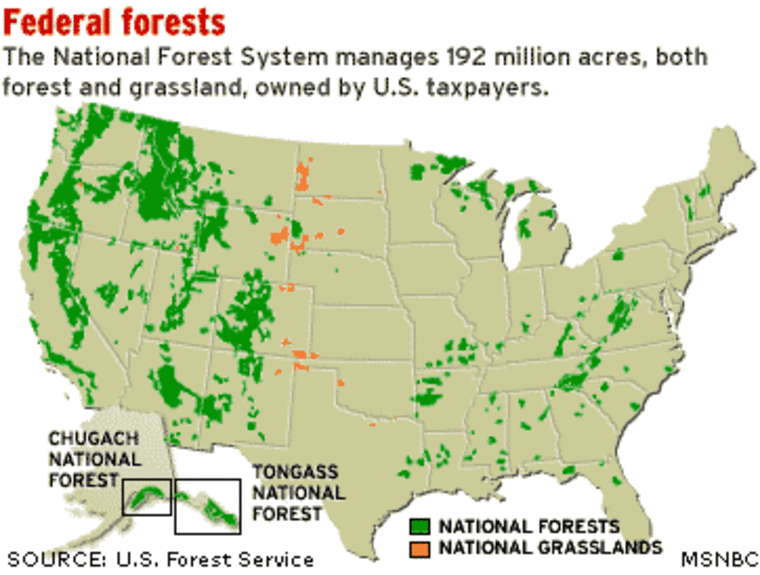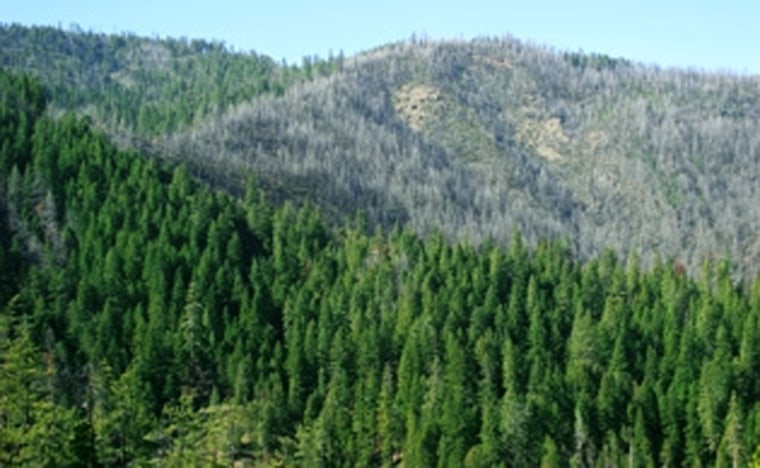The first timber sale likely to be harvested in a "roadless area" of a national forest since the Bush administration eased logging restrictions goes on the auction block Friday.
The U.S. Forest Service and the timber industry downplayed the significance of the sale of standing dead timber burned in the 2002 Biscuit fire on the Rogue River-Siskiyou National Forest, but environmentalists denounced it as a precedent opening the door to logging on nearly 60 million acres of national forests they had previously considered protected from logging.
"We're hoping that the Forest Service will recognize that this is an extremely divisive and counterproductive timber sale and agree to stop the sale," said Mike Anderson, a lawyer for The Wilderness Society in Seattle.
It remains to be seen if anyone will bid on the timber after four years of rotting on the stump, given high fuel prices, low log prices and the expense of removing the timber with helicopters.
The auction of the Mike's Gulch timber sale comes nearly four years after the Biscuit fire burned in a mosaic pattern through 500,000 acres in the rugged Klamath Mountains of southwestern Oregon. It was the nation's biggest wildfire in 2002.
The area has become a battleground for a political and scientific debate over how to handle the millions of acres of national forest burned by wildfire each year. The timber industry and Forest Service say logging speeds the regeneration of a new forest, and environmental groups and many scientists counter that leaving the process to nature produces a healthier forest.
Environmentalists have failed to win lawsuits to stop the logging, a bill to speed logging after wildfires on national forests has passed the House, and a congressional hearing has questioned a scientific study that found logging after the Biscuit fire had killed plentiful seedlings that sprouted naturally and left lots of wood on the ground for future fires.
Governor wanted delay
Oregon Gov. Ted Kulongoski has asked the Forest Service to delay timber sales in roadless areas until after it works through a new petition process created under the Bush administration's new roadless rule.
Forest Service spokesman Dan Jiron contends that the Mike's Gulch timber sale was part of a larger plan to restore a forest burned by wildfire, covered a small fraction of the area burned by the fire and was developed prior to implementation of the Bush administration's "roadless rule," so did not specifically fall under it.
The Mike's Gulch timber sale offers 9.3 million board feet of fire-killed timber from 261 acres within what is known as an inventoried roadless area.
Roadless areas are generally tracts larger than 5,000 acres in remote and rugged country where logging had been considered uneconomical. The Clinton administration decided they were more valuable for fish and wildlife habitat and clean water than timber, and adopted a policy that severely restricted logging within 58.5 million acres.
As supervisor of the Rogue River-Siskiyou National Forest, Scott Conroy approved the Mike's Gulch sale. He also oversaw development of the roadless rule under the Clinton administration.
"It was a difficult decision and I'm confident it's right for the forest," he said.

Four states sue
When the Bush administration took over, it moved to ease logging restrictions, adopting a new "roadless rule" giving states greater say over logging in roadless areas. Governors of Oregon, Washington, California and New Mexico have sued to overturn the new rule.
All but the biggest trees on the Mike's Gulch sale — more than 30 inches in diameter — are considered too rotten for lumber. The Forest Service expects to get $235,500 or $25.20 per thousand board feet, a fraction of prices paid for green timber.
"With fuel prices gone the way they are and the lumber market taking a downturn it's hard to pencil out," said Chris West, vice president of the America Forest Resources Council, a timber industry group in Portland. "I simply do not know (if anyone will bid)."
Rich Fairbanks, a retired Forest Service forester who led the team that developed the recovery plan for the Biscuit fire, said the costs of helicopter logging and restoration were so high, and the expected revenues so low, that the sale was likely to run a deficit — a prospect the Forest Service denied.
